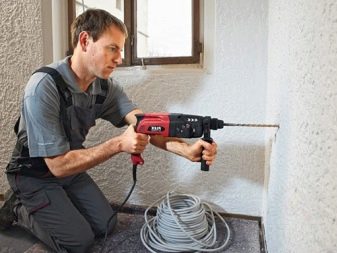How to use a puncher correctly?

You have to use a puncher in a variety of cases. This tool is literally irreplaceable when decorating and renovating residential and other premises. In skillful hands, the perforator replaces a number of other devices, the only thing left is to know how to use this device.
Peculiarities
Before figuring out individual nuances, you need to understand the general principles of the device. The main part of any rock drill is an electric motor. If it has increased power, then it is mounted vertically. But in structures that do not create significant effort, the engine is placed horizontally. The second option is preferable if you have to work in a confined space. But at the same time, we must not forget about the increased load on the motor and the weakness of cooling. If the designers chose a vertical layout, the cooling will be fine. In addition, this system creates less vibration. Another division is associated with the device of the percussion mechanism.

Almost all modern rock drills are equipped with an electro-pneumatic working part. It delivers powerful hits with relatively low energy consumption. When the engine rotates, the bushing inside the chain receives the force along the chain. The outer sleeve performs synchronously oscillatory movements. The good thing about the pneumatic system is that when idling, the device turns off itself.


How to prepare for work?
Before doing this or that work, you will have to select and install the required nozzle.
This means the need:
- remove the cartridge;
- clean it up;
- coat the inside of the cartridge with grease;
- put the cartridge in place;
- block the nozzle by lowering the ring.


Actions in different modes
For drilling, the toggle switch is moved to the appropriate position. Turning on the engine at idle speed, apply the nozzle to the place where the hole should be punched. To control the twisting speed of the drill and nozzle, a special trigger is used. Drilling occurs if you switch the rock drill to a different mode. It is usually denoted by a picture showing a hammer and a drill. Speed adjustments while drilling are rare.
To work in the mode of chiselling the material, the hammer drill is switched to the program indicated by the hammer icon. But that's not all - you need a bit that can act like a chisel.


Such a nozzle is fixed at the required angle with respect to the surface to be treated. To set the required number of strokes, as well as their strength, the trigger is pressed with different forces. This kind of work, which is important, requires a certain skill, and may not work out right away.
Individual rotary hammers can be used as a screwdriver. The necessary information is always indicated in the instructions for the device. To tighten the screws or unscrew them, you need a specific nozzle. There may not be a special screwdriver mode, usually the "Drilling" program is used instead.


General requirements and safety precautions
It is important to understand that regardless of the manipulations performed, the hammer drill is not a toy. This is a serious mechanism, and it is also energized. Whatever the purpose, you only need to work with special gloves and goggles. Outerwear is strictly long-sleeved.All buttons, zippers and other similar elements must be fastened all the way to prevent accidental gripping of the drill.
A useful addition for any home craftsman working with a hammer drill will be a shield worn on the cartridge. It will stop the flow of various particles of matter flying from the holes. You should be especially careful wherever there are hidden communications. It is useful not only to familiarize yourself with the drawing, but also on the surfaces themselves to mark the routes of wires, pipe routing. Workers should hold the hammer drill with both hands at chest level, and it is helpful to spread their legs slightly to gain more support.

It is unacceptable to use such a technique while standing on flimsy and unreliable stairs, on all kinds of boxes, on other props of dubious quality. Of course, the use of a punch in low light is prohibited. When hammering or drilling holes, the tool is directed at right angles to the wall. The slightest misalignment leads to cracking of the cartridge. It cannot be repaired, it will only be possible to replace it.
If a very long hole is to be drilled, it is best to do it in several steps. This way there will be fewer errors, the instrument will last longer, and it will be possible to clean up the channel, thereby reducing the operating time. Important: the hammer drill does not "like" strong pressure, there will definitely not be any practical benefit from pressing, but breakage is quite likely. If the device is in shock mode, you cannot start it at idle speed. Otherwise, the force usually spent on breaking through the material will break the mechanism.


When it is known that the wall is composed of loose material, it is processed only in the drilling mode. This reduces particle dispersal and saves time on cleaning. But hard surfaces are treated only with the use of a protective lubricant and liquid refrigerant. As soon as the tool has warmed up, it is immediately turned off and not started until it has completely cooled down. This is important even in cases where the deadline specified in the instructions has not yet passed.
It must be remembered that even the best rock drills make a lot of noise. Their use is allowed only from 7 to 23 hours. As soon as the work is over, the tool must be cleaned of dust. Store it strictly in warm and dry rooms. The drilling machine must be disassembled and lubricated periodically.


How to chisel walls for wiring?
This machine is even better suited for slitting than a conventional drill. It is much more reliable and quite effective in shock mode. For work, use a steel blade, nozzles with a short and long drill. Strictly along the selected line, holes are made 2.5 cm deep.The step between them should be from 1 to 1.5 cm.
The spatula allows you to clean the prepared grooves, remove all dirt from there. Tip: to make the initially uneven grooves smoother, they are finalized using a grinder with a diamond disc. But this method is accompanied by the release of a large amount of dust. You can remove it using an industrial vacuum cleaner. In any case, when the chasing is completed, you will have to ventilate the room.


How to drill metal?
The correct choice of drill is of great importance here. Surfaces made from hard steel grades must be drilled with cobalt-based alloy drills. Aluminum and other non-ferrous metals are drilled with the longest drills. Most types of metal will have to be pierced with products with a cutting part made of extra strong alloys. Sometimes nozzles with a cylindrical shank are used, installed through a special adapter.


Recommendations
When performing this work, care must be taken that the bore-holes are not skewed. It is possible to avoid turning the boreholes by firmly resting the tool against the surface to be treated. If, nevertheless, the part is jammed, you must immediately turn off the tool, and then turn it on again in reverse mode. When there is no such mode, you will have to remove the hole manually.When drilling, it is unacceptable to clean the working channel with your hands - this can lead to injury.
Many people are also interested in how to protect the room where the repair is being carried out from dust when drilling the ceiling. The classic method is threading a cardboard or plastic cup onto the working part of the tool. For the same purpose, you can use a special package. Sometimes they also take flat nylon cans without a lid.

To reduce the spread of dust that will bypass these attachments, include an industrial vacuum cleaner.
For information on how to use the puncher correctly, see the next video.













The comment was sent successfully.